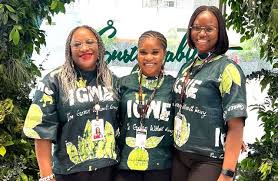Sahara Group, a leading international energy and infrastructure company, has introduced a new digital platform known as “I’m Green Without Envy” (IGWE) to promote sustainability and eco-friendly living among its employees. The initiative was launched during the recently held Sahara Sustainability Week, and the company says it aims to turn environmental protection into a rewarding daily habit rather than a mere obligation.
According to Ejiro Gray, Director of Governance and Sustainability at Sahara Group, the IGWE platform uses gamification to encourage positive environmental actions. Through IGWE, employees across Sahara’s global offices in Africa, Asia, Europe, and the Middle East can earn “Green Credits” for eco-friendly habits like reducing single-use plastics, saving energy, and participating in tree-planting activities.
Gray stated that the platform reflects Sahara’s unique philosophy of “Personal Corporate Social Responsibility (CSR),” where each staff member takes direct ownership of their contribution to the environment. She explained that the idea behind IGWE is to make sustainability exciting and desirable.
“At Sahara, we believe sustainability should be engaging, not something forced. With IGWE, employees can track their environmental impact, join team challenges, and earn rewards for making greener choices,” she said.
The app also offers leaderboards, allowing teams to compete in reducing their carbon footprints, volunteering for clean-up exercises, and participating in other sustainability-related campaigns. Gray added that the platform would also support real-world tree planting campaigns to fight deforestation and carbon emissions.
In 2023, global CO₂ emissions hit a record high of 36.8 billion metric tonnes, with plastic pollution and deforestation continuing to threaten environmental stability. Sahara Group says IGWE is its own way of responding to these global challenges through innovation and employee engagement.
Bethel Obioma, Head of Corporate Communications at Sahara Group, also spoke about IGWE’s potential to influence long-term behavioural change. According to him, research shows that 70% of behavioural shifts become permanent when tied to incentives and social accountability.
“IGWE takes the burden off sustainability. Instead of making employees feel guilty, it gives them fun and competitive ways to live green. It’s not just about logging actions; it’s about changing mindsets,” Obioma said.
He added that the app allows users to volunteer for environmental causes like clean-up drives and tree planting and tracks their contributions in a way that is visible and shareable within their community. This social aspect, he said, will keep people motivated and promote friendly competition among departments and regional teams.
The platform has already received wide acceptance among staff. During Sahara Sustainability Week, employees signed up enthusiastically, ready to log their “green actions” and compete in eco challenges.
Sahara Group says this initiative aligns with the United Nations Sustainable Development Goals (SDGs), especially Goal 13 on climate action and Goal 12 on responsible consumption. The company believes that corporate climate efforts must evolve with the times, using tools like digital culture, gamification, and behavioural science to achieve impact.
“Our goal is to spark a generational shift in how sustainability is viewed and practiced within and outside Sahara,” Obioma added. “That’s why we are rethinking our Environmental, Social, and Governance (ESG) strategies and adopting fresh, tech-driven approaches.”
By turning sustainability into a personal and competitive journey, Sahara Group hopes to influence employee behaviour in ways that extend to families and communities. The company believes that if individuals take ownership of climate action, the results will ripple across societies.
As IGWE gains momentum, it may well become a model for other companies looking to engage their workforce meaningfully in environmental protection. Sahara Group said it will continue to refine the app and expand its features based on employee feedback and evolving global trends in sustainability.
